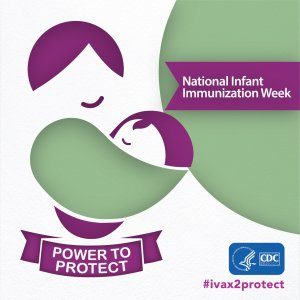 Each Spring, the U.S. Centers for Disease Control and Prevention (CDC) recognizes National Infant Immunization Week (NIIW) to shine a spotlight on “the importance of protecting children two years and younger from vaccine-preventable diseases (VPDs).” For 2022, the CDC placed particular emphasis on promoting timely vaccinations, noting “a troubling drop in routine childhood vaccination as a result of families staying at home” during the COVID-19 pandemic. Resources from NIIW 2022 are still available online. Here, vaccine attorney Leah V. Durant shares some of the highlights: Continue reading
Each Spring, the U.S. Centers for Disease Control and Prevention (CDC) recognizes National Infant Immunization Week (NIIW) to shine a spotlight on “the importance of protecting children two years and younger from vaccine-preventable diseases (VPDs).” For 2022, the CDC placed particular emphasis on promoting timely vaccinations, noting “a troubling drop in routine childhood vaccination as a result of families staying at home” during the COVID-19 pandemic. Resources from NIIW 2022 are still available online. Here, vaccine attorney Leah V. Durant shares some of the highlights: Continue reading
Category Archives: Centers for Disease Control and Prevention
Your Family’s Legal Rights After a Fatal Vaccine Injury
 Since Congress established the National Vaccine Injury Compensation Program (VICP) in 1988, less than 1,500 families have filed claims related to fatal vaccine injuries. Data from the U.S. Centers for Disease Control and Prevention (CDC) also indicate that vaccine-related deaths are rare. But, when these deaths occur, they are tragic regardless of the specific circumstances involved. Continue reading
Since Congress established the National Vaccine Injury Compensation Program (VICP) in 1988, less than 1,500 families have filed claims related to fatal vaccine injuries. Data from the U.S. Centers for Disease Control and Prevention (CDC) also indicate that vaccine-related deaths are rare. But, when these deaths occur, they are tragic regardless of the specific circumstances involved. Continue reading
What Injury Risks are Associated with the Rotavirus Vaccine?
 The U.S. Centers for Disease Control and Prevention (CDC) recommend the rotavirus vaccine for infants beginning at two months of age—with limited exceptions. While the approved rotavirus vaccines (RotaTeq and Rotarix) are generally considered safe, vaccine injuries still occur in a small percentage of cases. Learn what parents need to know about these risks from national vaccine injury attorney Leah V. Durant.
The U.S. Centers for Disease Control and Prevention (CDC) recommend the rotavirus vaccine for infants beginning at two months of age—with limited exceptions. While the approved rotavirus vaccines (RotaTeq and Rotarix) are generally considered safe, vaccine injuries still occur in a small percentage of cases. Learn what parents need to know about these risks from national vaccine injury attorney Leah V. Durant.
Mild Risks Associated with the Rotavirus Vaccine
Like all vaccines, the rotavirus vaccine carries a risk for certain side effects. The CDC classifies these side effects as “mild,” and they generally are not classified as vaccine injuries on their own. However, these side effects can also be symptoms of the vaccine injuries discussed below; and, as a result, parents whose children experience these side effects should monitor their children closely and seek medical attention promptly if necessary: Continue reading
Which CDC-Recommended Vaccines Are (and Aren’t) Covered Under the Vaccine Program?
 The National Vaccine Injury Compensation Program (VICP) pays compensation to eligible claimants who have been diagnosed with injuries and illnesses related to many CDC-recommended vaccinations. However, not all CDC-recommended vaccinations are covered. In this article, vaccine lawyer Leah V. Durant discusses which vaccines are covered, which ones are not covered, and what you can do if your vaccine isn’t covered under the VICP. Continue reading
The National Vaccine Injury Compensation Program (VICP) pays compensation to eligible claimants who have been diagnosed with injuries and illnesses related to many CDC-recommended vaccinations. However, not all CDC-recommended vaccinations are covered. In this article, vaccine lawyer Leah V. Durant discusses which vaccines are covered, which ones are not covered, and what you can do if your vaccine isn’t covered under the VICP. Continue reading
Hepatitis B Vaccine Injury Claims: What You Need to Know
 The U.S. Centers for Disease Control and Prevention (CDC) recommend vaccination against hepatitis B for children beginning at birth and for adults who have certain risk factors. Children should receive three doses of the hepatitis B vaccine before reaching nineteen months, and adults who need the vaccine should receive either two or three doses depending on the specific vaccine administered. Like all vaccines, the CDC considers hepatitis B vaccines to be safe for most people. But, some parents and vaccine recipients will need to hire a vaccine injury lawyer to help them recover just compensation. Continue reading
The U.S. Centers for Disease Control and Prevention (CDC) recommend vaccination against hepatitis B for children beginning at birth and for adults who have certain risk factors. Children should receive three doses of the hepatitis B vaccine before reaching nineteen months, and adults who need the vaccine should receive either two or three doses depending on the specific vaccine administered. Like all vaccines, the CDC considers hepatitis B vaccines to be safe for most people. But, some parents and vaccine recipients will need to hire a vaccine injury lawyer to help them recover just compensation. Continue reading
Tetanus Vaccine Injury Claims Under the VICP
 Tetanus is among the many diseases for which the U.S. Centers for Disease Control and Prevention (CDC) recommend routine vaccination. Like all CDC-recommended vaccines, the tetanus vaccines (including DTaP, DTP, DT, Td and TT) are generally considered safe, but they present risks for certain injuries and illnesses in a very small percentage of cases. In this article, vaccine lawyer Leah Durant explains the process of seeking compensation for tetanus vaccine injuries under the National Vaccine Injury Compensation Program (VICP). Continue reading
Tetanus is among the many diseases for which the U.S. Centers for Disease Control and Prevention (CDC) recommend routine vaccination. Like all CDC-recommended vaccines, the tetanus vaccines (including DTaP, DTP, DT, Td and TT) are generally considered safe, but they present risks for certain injuries and illnesses in a very small percentage of cases. In this article, vaccine lawyer Leah Durant explains the process of seeking compensation for tetanus vaccine injuries under the National Vaccine Injury Compensation Program (VICP). Continue reading
Didn’t Get Vaccinated During the 2020-2021 Flu Season? The CDC Still Recommends Getting a Flu Shot
 As flu season draws to a close, many people are realizing that they never got around to getting their annual flu shot. With everything going at the end of 2020 and the start of 2021, this is understandable. Despite low vaccination rates, the 2020-2021 flu season was one of the least-impactful on record (due in large part to social distancing and mask-wearing to prevent the spread of COVID-19), and the low number of flu-related deaths is being viewed as one of the few silver linings of the pandemic. Continue reading
As flu season draws to a close, many people are realizing that they never got around to getting their annual flu shot. With everything going at the end of 2020 and the start of 2021, this is understandable. Despite low vaccination rates, the 2020-2021 flu season was one of the least-impactful on record (due in large part to social distancing and mask-wearing to prevent the spread of COVID-19), and the low number of flu-related deaths is being viewed as one of the few silver linings of the pandemic. Continue reading
Is It True that I Shouldn’t Get a Flu Shot if I have an Egg Allergy?
 In prior years, the U.S. Centers for Disease Control and Prevention (CDC) have advised that individuals who have egg allergies should consult with their physicians prior to getting the flu shot. This is because certain formulations of the flu shot are manufactured with egg proteins, and exposure to these proteins has the potential to cause a hypersensitivity reaction among individuals with egg allergies.
In prior years, the U.S. Centers for Disease Control and Prevention (CDC) have advised that individuals who have egg allergies should consult with their physicians prior to getting the flu shot. This is because certain formulations of the flu shot are manufactured with egg proteins, and exposure to these proteins has the potential to cause a hypersensitivity reaction among individuals with egg allergies.
In 2018, however, the CDC altered its recommendations regarding the flu shot and individuals who have minor egg allergies. Now, according to the CDC: Continue reading
CDC Publishes Updated Guide for Parents: “Your Child’s First Vaccines”
 The U.S. Centers for Disease Control and Prevention (CDC) recently published an updated version of its guide for parents titled, Your Child’s First Vaccines: What You Need to Know. In addition to being posted on the CDC’s website, the guide is also available in .PDF format, and the CDC encourages doctors to provide parents with a copy of the guide when they bring their children in for their first immunizations. Continue reading
The U.S. Centers for Disease Control and Prevention (CDC) recently published an updated version of its guide for parents titled, Your Child’s First Vaccines: What You Need to Know. In addition to being posted on the CDC’s website, the guide is also available in .PDF format, and the CDC encourages doctors to provide parents with a copy of the guide when they bring their children in for their first immunizations. Continue reading
Should You Still Get a Flu Shot During the COVID-19 Crisis?
 Among the many concerns raised by the COVID-19 crisis, one question many people have is whether they should still get their annual flu shot. The 2020-2021 flu season is here, and this is the time of year when many individuals and families visit their doctors, pharmacies and health departments to get vaccinated. Continue reading
Among the many concerns raised by the COVID-19 crisis, one question many people have is whether they should still get their annual flu shot. The 2020-2021 flu season is here, and this is the time of year when many individuals and families visit their doctors, pharmacies and health departments to get vaccinated. Continue reading
